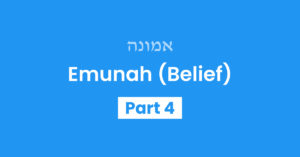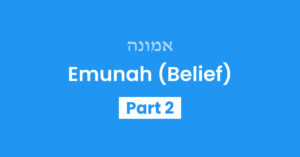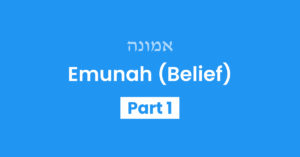In the past two weeks, we have been working on deepening our Emunah, which Chazal teach us is the purpose of our entire existence, and is the key to unlocking our Ultimate Redemption. One aspect of Emunah is believing in “Yecholes” – that Hashem can do anything, even if it requires changing the rules of nature. Another aspect of Emunah is believing in Hashgacha – that Hashem cares about what happens in this world, and only He decides what will happen in our lives.
Both of these fundamental aspects of a Emunah were proven to be true when Hashem did the many miracles in Egypt. For this reason, we are required to remember Yetzias Mitzrayim every day of our lives, to strengthen our belief in these two aspects of Emunah.
This week, let’s take a look at a different aspect of Emunah – the belief in Yichud Hashem (the “Oneness” of Hashem). Believing in Yichud Hashem means recognizing that Hashem is the one and ONLY power that exists, and nothing can stop Him.
Believing in Yichud Hashem means recognizing that Hashem is the one and ONLY power that exists, and nothing can stop Him.
People and Power
Why wouldn’t a person believe in Yichud Hashem? Well, a person might think that Hashem is super powerful, but there are still other powers in the world which can compete with His power. Believing in Yichud Hashem means realizing that this is not true. Hashem is the only power that exists, and anything else that seems to have power is just an illusion.
Sometimes, we might feel like other people have the power to determine what will happen in our lives: My boss decides how much money I will make, the shadchan decides if I will get married, and the bus driver decides if I’ll get to school on time. But all these people are just like puppets in Hashem’s hands. Hashem might use these people as “messengers” to carry out His will, but ultimately, only He decides what will happen.
If Hashem decided that it would be good for me to be late to work (for a reason that I might never understand!), Hashem might send a person to take that great parking spot and make me drive in circles for another 10 minutes trying to find another spot. But it wasn’t that person who caused me to be late; rather, it was the will of Hashem.
Believing in Our Own Power
Aside from realizing that other people have no power to decide what happens to us, another corollary of believing in Yichud Hashem is learning not to rely on our own power, either.
Imagine that you cross the street one day, and someone asks you: “Wow!!! How did you cross the street so smoothly like that?!”
You are confused. “What do you mean?” you respond. “Of course I crossed the street. It was easy. I just looked both ways, then lifted up my feet and started walking.”
It’s normal to think this way, but the truth is that this thought pattern is missing an essential aspect of Emunah. Who created your feet to begin with? Who gave you the energy to lift your feet? Granted, Hashem usually gives us the strength to walk on a daily basis, but we must never forget that our strength belongs to Hashem alone.2 And Hashem can take away our strength, chas veshalom, if He would ever decide to do so.
Our strength belongs to Hashem alone.
This is actually what happened to Yeravam ben Navat, a king in the times of the Navi. Yeravam was doing many sins, so one day, Hashem sent a prophet to warn Yeravam that he will soon be punished for his sins. King Yeravam was obviously disturbed by the prophet’s predictions, so he stretched out his arm to command that someone should catch the prophet and take him away. But Hashem froze King Yeravam’s arm in mid-air!3 Yeravam was unable to move his own arm. This was a shocking reminder that he does not control his own body. Rather, every person is controlled by Hashem alone.
Frightening or Reassuring?
Although on the one hand (excuse the pun!) it’s scary that we do not control our own strength, on the other hand, it’s actually very reassuring. How so?
We can think about it this way: If I control my own strength, that means that I have certain limitations: I can only run a certain number of miles, and I can only withstand a certain number of temptations before I cave in. But if I remember that all of my strength comes from Hashem, I can accomplish far more than I ever imagined.
If I control my own strength, then I have certain limitations. But if I remember that all of my strength comes from Hashem, I can accomplish far more than I ever imagined.
This is what Bas Pharaoh experienced when she stretched out her hand to save Moshe, when he was a baby floating in the Nile. Although Moshe was too far away for her to reach, she stretched out her hand anyway, and Hashem made a miracle that she was able to reach him. Similarly, the small group of Chashmonaim in the times of Chanukah didn’t think they could ever defeat the huge Greek army, but they fought anyway for the sake of saving Judaism – and Hashem miraculously helped them win the battle.
We, too, can experience miracles if we remember that all of our strength comes from Hashem, and that He can help us accomplish more than we ever imagined. The coming week of Pesach is an especially opportune time to do so, because “Mitzrayim” (מצרים) comes from the root “Tzar” (צר) which means “narrow” or “limited.” Just as Hashem freed us from the limitations of Mitzrayim, Hashem can also help each of us break through and reach beyond our personal physical or spiritual limitations.
Throughout the next 2 weeks, let’s practice remembering that all of our strength comes from Hashem alone, so that we can deepen our Emunah, and hopefully merit to witness the miracles of our Ultimate Redemption speedily in our days.
Sources: [1] The Six Constant Mitzvos, by Rabbi Yehuda Heimowitz and Rabbi Shai Markowitz, pg. 117; [2] Devarim 8:18; [3] Melachim I Perek 13
Your Challenge
Once a day, ask Hashem for help doing something “regular” in order to remember that your strength comes from Hashem.
FOR EXAMPLE:
- Please, Hashem, help me cross the street safely.
- Please, Hashem, help me walk up these steps.
- Please, Hashem, help me remember the information that I’m studying.
Torah Questions
- Which of Moshe Rebbeinu’s body parts were called “emunah” in Shemos 17:12?
- Which Navi said to the Jewish people: “How long are you going to sway back and forth between believing in Hashem and believing in Baal (a type of Avodah Zara)?” (Melachim I 18:21)
- What did the Jewish people say when this Navi finally proved to them that Hashem is the real G-d? (Melachim I 18:39)
- Who said “believe in Hashem” in Divrei HaYamim II 20:20?
- Which 2 people said: “Hashem is with us – do not be afraid!” in Bamidbar 14:9?
- When a person dies, the Heavenly Court asks him several questions. One of the questions is: “Did you ____ with Emunah?” (Shabbos 31b)
Questions to Ponder
- When men put on tefillin in the morning, they say the passuk “V’Eirasteech Li b’Emunah – and I shall betroth you to Me [Hashem] with Emunah.” What does it mean to be “betrothed with Emunah”? And what does that have to do with putting on tefillin?
- The Gemara says that the generation of Jews who left Egypt were lacking in Emunah, because when Hashem split the Sea and led them through on dry land, they said: “Just as we are coming out of the Sea on this side, the Egyptians are also emerging from the other side.” But how could the Jewish people have said this, if we also know they sang “Az Yashir” – in which they thanked Hashem for making the Egyptians drown?
- The Mechilta says that Avraham Avinu only earned his Olam Haba (and Olam HaZeh) in the merit of his belief in Hashem. How could this be? Why was Avraham’s Emunah more powerful than the rest of the 10 tests that he passed… including Akeidas Yitzchak – being willing to sacrifice his own son for the sake of Hashem?
- The Midrash writes that Noach was lacking in his Emunah; he didn’t enter the Teivah (ark) until the waters of the flood came up to his ankles. But how could Noach have been lacking in Emunah, if he heard Hashem speaking to him directly? How could he possibly doubt what Hashem had said?





